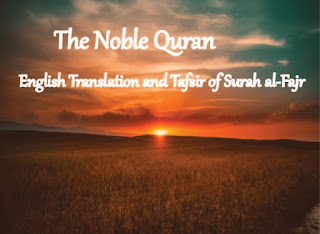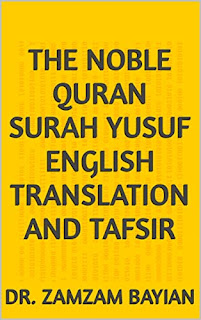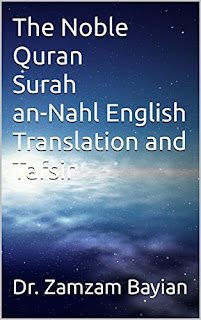89:1 By the dawn,
89:2 by the ten nights,
89:3 by the even and the odd,
89:4 and by the night when it passes!
89:5 Is there in that a solemn oath for one who is mindful?
89:6 Have you not seen how your Lord dealt with Ad,
89:7 Iram of the pillars,
89:8 the like of which was never created in the land,
89:9 and Thamud, who carved out the rocks in the valley,
89:10 and Pharaoh, of the stakes,
89:11 who all transgressed in the lands,
89:12 and made much mischief therein?
89:13 So your Lord poured on them a scourge of punishment.
89:14 Indeed, your Lord is ever watchful.
Tafsir
89:1 By the dawn,
89:2 by the ten nights,
89:3 by the even and the odd,
89:4 and by the night when it passes!
89:5 Is there in that a solemn oath for one who is mindful?
Allah swears by some beneficial things that indicate His perfect ability at the beginning of surah al-Fajr.
First, Allah swears by the dawn, which is the time of the day when light first appears in the sky, just before the sun rises. The scholars mention the following six opinions about the meaning of the dawn: 1) It refers to the dawn of any day. 2) It refers to the al-Fajr prayer ‘dawn prayer.’ 3) It refers to the entire day and the dawn is mentioned because it is the beginning of the day. 4) It refers to the dawn of the tenth day of the month of Dhu al-Hjjah. 5) It refers to the first day of the month of Dhu al-Hjjah. 6) It refers to the first day of the month of al-Muharram, the first month in the Islamic calendar.
Second, Allah swears by the ten nights. The scholars mention the following four meanings for the ten nights. 1) They are the first ten nights of the month of Dhu al-Hjjah. 2) They are the last ten nights of the month of Ramadan. 3) They are the first ten nights of the month of Ramadan. 4) they are the first ten nights of the month of al-Muharram. After mentioning the opinions of the scholars, Imam Muhammad bin Jarir at-Tabari, may Allah have mercy on him, said, ‘The correct opinion is that the ten nights refer to the first ten nights of the month of Dhu al-Hjjah because the eminent scholars unanimously have this opinion. In addition, Abdul Allah bin Jabir, may Allah be pleased with him, reported that Messenger Muhammad said, ‘[ By the dawn, by the ten nights…] [89:1-2] The ten nights are the ten nights of the month of Dhu al-Hjjah.’
Third, Allah swears by the even and the odd. The scholars differ about the meaning of the even and the odd. Some of their opinions are as follows: 1) The even refers to the ten-day of the month of Dhu al-Hjjah and the odd refers to the night of the ninth day of the month of Dhu al-Hjjah. 2) The even and the odd refer to the prayer as some prayers consist of even units; whereas, other prayers consist of odd units. 3) The even refers to all things that Allah has created and the odd refers to Allah, Exalted be He. 4) The even refers to Prophet Adam and his wife Eve and the odd refers to Allah, Exalted be He. 5) The even refers to the ranks of Paradise as they are eight ranks; whereas, the odd refers to the ranks of Hell as they are seven ranks. After mentioning the opinions of the scholars, Imam Muhammad bin Jarir at-Tabari, may Allah have mercy on him, said, the correct opinion is that Allah swears by the even and the odd. He has not specified a particular kind of the even nor the odd. There is also neither authentic narration nor intellectual evidence that specifies their meanings. Thus, every even and odd is of the things that Allah swears by because the oath is general.’
Fourth, Allah swears by the night when it passes, namely, I swear by the night when it passes and leaves with its darkness so that the day with its light and brightness comes after it. The scholars of Tafsir maintain that the night refers to every night, which is the apparent meaning; that it refers to the night before the tenth day of the month of Dhu al-Hjjah; and that it refers to the night of the Decree in the month of Ramadan.
89:5 Is there in that a solemn oath for one who is mindful?
The interrogation is for confirmation and showing honor to the creatures by which Allah, Exalted be He, swears.
Is there in the things by which Allah swears a solemn oath that can convince a mindful person? Undoubtedly, any person, who is endowed with a sound mind, will certainly know that the things by which Allah swears deserve to be sworn by, as they are great things.
The intended meaning is as follows: ‘O disbelievers, you will be punished just as the former disbelievers were punished.’
89:6 Have you not seen how your Lord dealt with Ad,
89:7 Iram of the pillars,
89:8 the like of which was never created in the land,
The interrogation is to confirm the viewing (knowledge) since the disbelievers of Mecca know news about the former destroyed nations. Therefore, their certain knowledge is likened to seeing by the eyes with regard to clarity and clearness. The viewing may refer to seeing by the eyes since some of the disbelievers saw the remains of the destroyed nations.
Ad refers to a tribe that used to live in an area called al-Ahqaf, a place in the south of the Arabian Peninsula. The people of Mecca used to pass by it when traveling. The tribe is named after its great father Ad. Allah sent Prophet Hud to invite its people to worship Him alone; however, most of them rejected his invitation and only a few numbers accepted it. Thus, Allah punished the disbelievers and saved Prophet Hud and the believers.
O noble Messenger Muhammad, have you not seen how your Lord dealt with Ad? Have you known what happened to the tribe of Ad whose members were descendants of Ad son of Iram son of Shem son of Prophet Noah? Those people were tall and had strong and bulky bodies. They were the strongest among their contemporaries. Their dwellings had high pillars. No tribe was like Ad in terms of strength and no city was like their city in terms of having strong and secure structures.
89:9 and Thamud, who carved out the rocks in the valley,
Thamud refers to the tribe of Prophet Saleh. It was named after its great father Thamud. Allah sent Prophet Saleh to invite its people to worship Him alone and avoid worshiping false gods besides Him. They rejected to believe in his message. Therefore, Allah saved Prophet Saleh and the believers and punished the disbelievers.
The tribe of Thamud used to live in an area between ash-Sham and al-Hejaz, nowadays in Saudi Arabia, it is called Mada’in Saleh, and it is also called the valley of al-Qura. The people of Thamud used to carve the rocks in the mountains to make their houses.
89:10 and Pharaoh, of the stakes,
Pharaoh used to have soldiers, who used to strengthen his authority, and he had stakes. The scholars of Tafsir have different opinions about the meaning of the stakes. 1) Pharaoh used to have stakes to which he would tie people to torment them. 2) The stakes refer to strong and stable buildings. 3) The stakes refer to Pharaoh’s soldiers, who used to support and strengthen his kingdom. 4) The stakes refer to high buildings that Pharaoh used to build and then he would slaughter people on them [Zad al-Masir fi Ilm at-Tafsir].
O noble Messenger Muhammad, you have known how Allah dealt with the tribe of Ad that is a descendant of Shem son of Prophet Noah. It used to have great pillars for raising their dwellings and no tribe was created that resembled it in terms of strength and power. You have also known how Allah dealt with the tribe of Thamud that used to carve the rocks in the mountains to build their houses therein. You have also known how Allah dealt with Pharaoh, who had great buildings and many soldiers who strengthened his kingdom.
89:11 who all transgressed in the lands,
89:12 and made much mischief therein?
Those people transgressed in the lands and spread much mischief therein. They disobeyed Allah’s commands and went beyond all bounds of disobedience and wrongdoing.
89:13 So your Lord poured on them a scourge of punishment.
89:14 Indeed, your Lord is ever watchful.
Those wrongdoers transgressed in the lands and spread corruption, so Allah’s severe punishment befell them.
Allah’s punishment might be in the form of a violent wind that destroyed them, or a terrible earthquake that swallowed them, or a great flood that overwhelmed them. They will also suffer severe punishment in the Hereafter.
The ayah used the verb ‘poured’ to show that the punishment that befell the disbelievers was violent and ceaseless. It was like rain that falls relentlessly and forcefully.
O noble Messenger Muhammad, your Lord, Allah, is ever watchful. He closely watches people’s deeds and counts them and He will recompense them on the Day of Judgment according to their deeds, good or evil.
The ayah implies a warning to the disbelievers and wrongdoers. If they insist on disbelieving in Allah’s Oneness and transgressing limits that Allah has prescribed, His punishment will befall them just as it befell the former disbelievers and wrongdoers. Thus, they should repent of their sins before it is too late.
Learned Lessons from Surah al-Fajr Ayah 1-14
• The disbelievers will inevitably be punished for their disbelief in Allah’s Oneness. Allah, Exalted be He, swears by the dawn, the first ten nights of the month of Dhu al-Hjjah, the even and the odd, and the night when it passes that the disbelievers will certainly be punished. Allah’s swearing by these things indicates their honorable ranks as they are beneficial for religious and worldly matters. They also clear proofs confirming Allah’s Oneness and ability.
• Allah can swear by whatever things of His creatures, but the created beings can only swear by Allah.
• Allah is able. Just as He destroyed the former disbelievers when they insisted on disbelieving in His Oneness and transgression, He will resurrect people for reckoning on the Day of Judgment.
• Allah’s punishment is severe. Those who disobey His commands should fear His punishment.
The Noble Quran: English Translation of Surah al-Fajr
The Noble Quran: English Translation of Tafsir ibn Kathir
The Holy Quran, Tafsir of Surah al-Inshiqaq Ayah 1-15 Some Horrors of the Day of Judgment
The Noble Quran Surah Hud English Translation and Tafisr




